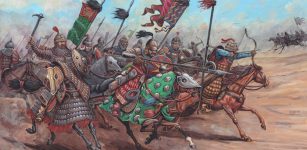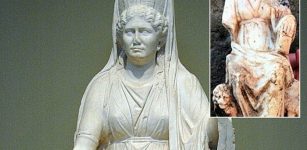The Phrase Hip Hip Hooray Has Ancient Roots
AncientPages.com - Today the phrase hip hip hooray is used in many countries as a cheering called out to express praise or approbation toward someone or something.
It's not entirely clear who used the phrase for the first time. According to some sources the phrase can be traced to a Medieval battle, but there are also suggestions the words were first spoken by a German shepherd or yelled by 17th century sailors. Yet, another possibility is the phrase can be traced to ancient Mongolia.
Researching the etymology and history of the cheer "hip hip hooray" is by no means easy.
Jerusalem
Most sources suggest that the word "hip" stems from a medieval Latin acronym, "Hierosolyma Est Perdita", meaning "Jerusalem is lost" This was later shortened by Germanic tribes fighting Jews to "Hep Hep Hu-raj", meaning loosely "Jerusalem is fallen and we are on the way to paradise."
An almost identical phrase was used in a Hungarian battle cry "Huj Huj Hajrá", which more or less just meant "faster, faster".
See also:
The Word Freelancer Originates From Medieval Mercenary Knights
What Was Pax Deorum And How Important Was It?
Who Were The Hoplites And What Was Their Armor Composed Of ?
Another theory is that the phrase comes from a Germanic shepherds cry or a hunter's cry "hep hep", which was used to rally their trained dogs. It is also possible that this shepherd's cry was not the origin, but rather itself was from the proposed Germanic battle cry "Hep Hep Huraj".
There are also two theories about the word "hooray". One option is that it came from the 17th century sailor's cheer, "huzzah. Other's think it's from a Mongolian exclamation of a similar sound, which is meant to be a cry of bravado.
So, we really can't trace the beginning of the phrase, but one thing is clear - it's still very popular.
Copyright © AncientPages.com All rights reserved. This material may not be published, broadcast, rewritten or redistributed in whole or part without the express written permission of AncientPages.com
More From Ancient Pages
-
 Extraordinary 6,500-Year-Old “Noah” Skeleton Re-Discovered – A Survivor Of The Great Flood Hidden In Museum
Civilizations | Aug 6, 2014
Extraordinary 6,500-Year-Old “Noah” Skeleton Re-Discovered – A Survivor Of The Great Flood Hidden In Museum
Civilizations | Aug 6, 2014 -
 Fragment Of Unique Ancient Greek Terracotta Statue Uncovered In Underwater Diggings
Archaeology | Mar 26, 2017
Fragment Of Unique Ancient Greek Terracotta Statue Uncovered In Underwater Diggings
Archaeology | Mar 26, 2017 -
 Why Did Ancient Romans Build So Many Straight Roads?
Ancient History Facts | Aug 9, 2017
Why Did Ancient Romans Build So Many Straight Roads?
Ancient History Facts | Aug 9, 2017 -
 World’s Oldest And Largest Maya Structure Revealed By LIDAR
Archaeology | Jun 9, 2020
World’s Oldest And Largest Maya Structure Revealed By LIDAR
Archaeology | Jun 9, 2020 -
 Ancient DNA Reveals How Yamnaya People Re-Wrote Northern Europeans’ Genetic Story 5,000 Years Ago
DNA | Jan 12, 2024
Ancient DNA Reveals How Yamnaya People Re-Wrote Northern Europeans’ Genetic Story 5,000 Years Ago
DNA | Jan 12, 2024 -
 On This Day In History: Howard Carter Discovered King Tut’s Tomb In The Valley Of The Kings – On Nov 4, 1922
News | Nov 4, 2016
On This Day In History: Howard Carter Discovered King Tut’s Tomb In The Valley Of The Kings – On Nov 4, 1922
News | Nov 4, 2016 -
 10 Surprising Facts About The Neanderthals Who Were Not As Primitive As Previously Thought
Ancient History Facts | May 6, 2017
10 Surprising Facts About The Neanderthals Who Were Not As Primitive As Previously Thought
Ancient History Facts | May 6, 2017 -
 Mysterious Sumerian Star Tablet And Strange Divine Omens – Communication With The Gods – Part 2
Featured Stories | Feb 18, 2021
Mysterious Sumerian Star Tablet And Strange Divine Omens – Communication With The Gods – Part 2
Featured Stories | Feb 18, 2021 -
 1154 Ancient Holes At Løykja Reveal Something Extraordinary – Archaeologists Say
Archaeology | Jul 17, 2020
1154 Ancient Holes At Løykja Reveal Something Extraordinary – Archaeologists Say
Archaeology | Jul 17, 2020 -
 On This Day In History: 55 Delegates Convened To Write What Would Become The U.S. Constitution – On May 14, 1787
News | May 14, 2016
On This Day In History: 55 Delegates Convened To Write What Would Become The U.S. Constitution – On May 14, 1787
News | May 14, 2016 -
 Valley Of Thracian Kings With More Than 1,500 Ancient Burial Mounds
Artifacts | Dec 10, 2018
Valley Of Thracian Kings With More Than 1,500 Ancient Burial Mounds
Artifacts | Dec 10, 2018 -
 Why Pharaoh Seti I’s Tomb Had To Be The Most Glorious And Largest Ever Built In Valley Of The Kings
Featured Stories | Jun 19, 2021
Why Pharaoh Seti I’s Tomb Had To Be The Most Glorious And Largest Ever Built In Valley Of The Kings
Featured Stories | Jun 19, 2021 -
 Mystery Of The Avars Who Conquered The Roman Empire Solved By Scientists
Civilizations | Apr 1, 2022
Mystery Of The Avars Who Conquered The Roman Empire Solved By Scientists
Civilizations | Apr 1, 2022 -
 On This Day In History: Battle Of Rain Was Fought On April 15, 1632, During The Thirty Years’ War
News | Apr 15, 2016
On This Day In History: Battle Of Rain Was Fought On April 15, 1632, During The Thirty Years’ War
News | Apr 15, 2016 -
 Mystery Of The Marble Lions On The Sacred Island Of Delos Solved?
Archaeology | Oct 12, 2021
Mystery Of The Marble Lions On The Sacred Island Of Delos Solved?
Archaeology | Oct 12, 2021 -
 Uraeus – Sacred Emblem That Symbolized Sovereignty, Royalty, Deity And Divine Authority In The Land Of Pharaohs
Featured Stories | May 30, 2022
Uraeus – Sacred Emblem That Symbolized Sovereignty, Royalty, Deity And Divine Authority In The Land Of Pharaohs
Featured Stories | May 30, 2022 -
 Nomenclator: Ancient Living-Human Calendar And Address Book
Ancient History Facts | Jul 4, 2018
Nomenclator: Ancient Living-Human Calendar And Address Book
Ancient History Facts | Jul 4, 2018 -
 Sacsayhuamán – Was It Built By ‘Demons’ Or Viracocha The Bearded God?
Civilizations | Apr 10, 2014
Sacsayhuamán – Was It Built By ‘Demons’ Or Viracocha The Bearded God?
Civilizations | Apr 10, 2014 -
 Evidence Of Beer Drinking 9,000 Years Ago In Southern China Discovered
Archaeology | Sep 1, 2021
Evidence Of Beer Drinking 9,000 Years Ago In Southern China Discovered
Archaeology | Sep 1, 2021 -
 Marble 2th Century AD Statuette Of Goddess Cybele Unearthed In Bulgaria’s Plovdiv
Archaeology | Nov 5, 2019
Marble 2th Century AD Statuette Of Goddess Cybele Unearthed In Bulgaria’s Plovdiv
Archaeology | Nov 5, 2019


